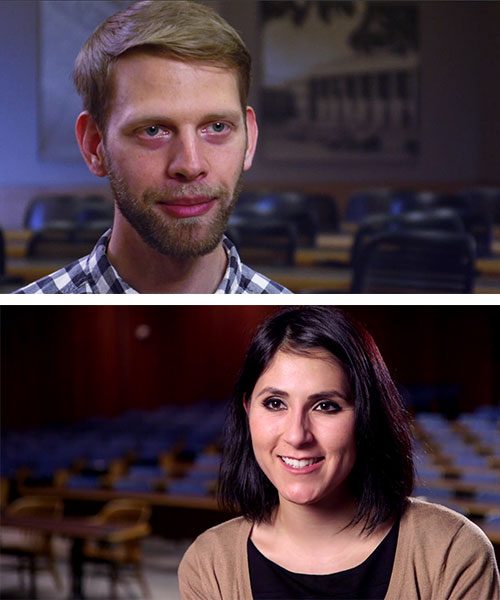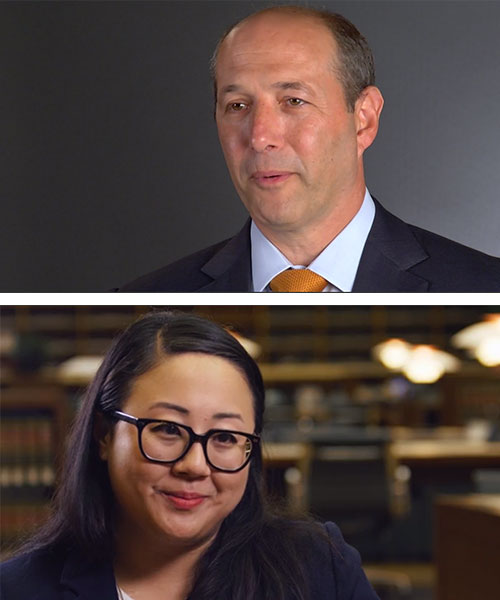By Andrew Cohen

For Carolina Garcia ’16, the road to law school was filled with potholes. Her father, from rural Mexico, never went to school. Her mother was removed from school in 4th grade. Garcia grew up in a poor neighborhood surrounded by gangs. Undaunted, she never lost sight of her dream to pursue her studies—with encouragement from her family.
“They didn’t want me to become a statistic, because statistically speaking I should not be here,” said Garcia, a financial aid recipient at Berkeley Law. “I really want to be an example for people, especially for girls who are from poor families…that you can become a lawyer, and that you’re not limited by where you came from.”
To ensure that students like Garcia can continue to attend Berkeley Law, Dean Sujit Choudhry recently launched the Access for All Challenge—a fundraising campaign for need-based aid to help the school remain accessible to all qualified applicants.
California’s original higher education master plan guaranteed a free college education for qualified state high school students. Funding woes, however, led the state to break that promise. Over the past quarter-century, state support for public colleges and universities has plummeted and tuitions have soared. At Berkeley Law, that support has dropped from about 76 percent of the school’s revenues in 1990 to 11 percent today.
“If alumni consider the opportunities they received as a result of an exceptional and affordable education—and how that changed their lives—I think they’ll embrace the Access for All Challenge and how it can help change the lives of our current and future students,” Choudhry said.
The goal is to raise $2 million by June 30, 2015—an effort made possible by two generous alumni who will provide matching funds at various levels. Gifts made by alums who graduated in 2000 or later will generate a matching donation triple that amount. Gifts made by alums who graduated between 1990 and 1999 will generate a matching donation double that amount. And gifts made by alums who graduated in 1989 or earlier will be matched at the same amount.

Students’ stories
While growing up in Ashland, Oregon, Berkeley Law student Tim Shadix ’16 endured some trying financial hardships. He is now involved with the housing clinic at the law school’s East Bay Community Law Center, where he works to prevent low-income tenants from being evicted.
“My family didn’t always have a lot of money,” Shadix said. “I certainly would not have been able to consider going to Berkeley Law without the really generous financial package that was offered to me here.”
Cristina Sepe ’15, a first-generation college and graduate school student, “burst out crying” when she received Berkeley Law’s letter confirming that she would have sufficient grant money to enroll. “I’m very passionate about ensuring equitable access to education,” she said. “It’s really important that more students from communities like mine can go to places like Boalt.”
Garcia, Shadix, Sepe, and two other students—Adrian Kinsella ’15 and Jameson Miller ’16—share their stories and discuss what the law school means to them in videos posted on the Access for All Challenge webpage.
A video is also posted of former U.S. Ambassador to Australia Jeff Bleich’ 89, now a partner at Munger, Tolles & Olson in San Francisco. In it, Bleich credits his entire career to the school’s low tuition when he enrolled.
.jpg)
“I wouldn’t have been able to become a lawyer if it hadn’t been for Berkeley because I couldn’t afford to go to any other law school,” he said. “And I paid for it with the money I earned during the summers. You can’t do that today. The cost of a Berkeley education is nine times what it was back in my day. So it’s up to us, the alums, to pay it forward—to give that same opportunity to the next generation, the opportunity that we had.”
The school has steadily increased its annual financial aid expenditures—from $7.2 million in Fiscal Year 2009 to $13.3 million this past fiscal year. Those expenditures span scholarships, grants, summer fellowships, and post-graduate Bridge fellowships. More is needed, however, to sustain Berkeley Law’s tradition of providing a top-tier legal education to qualified students from all economic circumstances.
“We cannot succeed in our public mission without diverse classes and admissions fundamentally based on merit, and unless students can come here irrespective of background,” Choudhry said. “That’s why the Access for All Challenge is so important.”
The student videos were produced and directed by Susan Gluss.